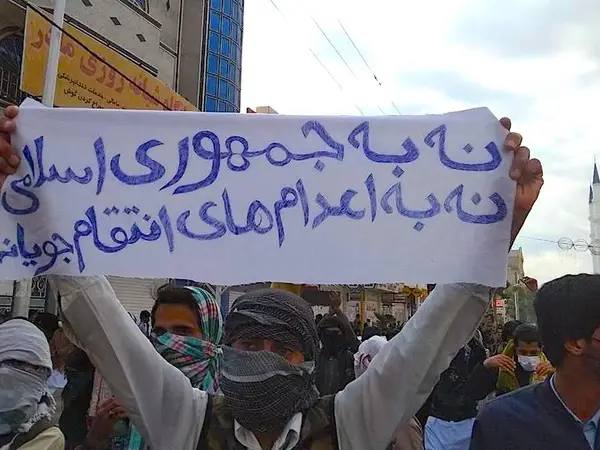The Islamic Republic hanged a member of the Baluch minority Thursday morning, bringing the number of the executed Baluch prisoners to 19, including two women, in five days.
Right groups have described the promptness of the regime’s executions of Baluch prisoners in recent weeks as “an official policy to intimidate protesters in Sistan and Baluchistan province,” where anti-regime rallies have been held weekly since the "Women, Life, Freedom” protests began in September.
The Thursday execution was carried out at Mashhad Central Prison and there are unconfirmed reports that several other people from the minority group have been transferred to death rows.
As Sunni Muslims, Baluch citizens are both an ethnic and religious minority. Estimates of the Iranian Baluch population range from 1.5 to 2 million people.
The Baluch community – along with the Kurds -- has always been among the most persecuted minorities of Iran, and has the largest number of people executed in the country. Most of the Baluchs are executed over drug-related charges, but activists say their cases do not receive due process through a fair trial and that the regime uses drug charges as a pretext to avenge 30 consecutive weeks of widespread protests after their Friday prayers.
The region is among the most impoverished ones across Iran and given the high rate of unemployment and no proper infrastructure, smuggling fuel, goods and in some cases drugs are their only lifeline.
More than 110 people from the community have been reportedly executed during the past four months, with activists voicing worries that the number is higher and there are cases that have not been reported in the media.
Journalist and activist Mehdi Nakhl-Ahmadi told Iran International that one of the common characteristics of these recent cases is the “unfair trials” and a “lack of due judicial process,” highlighting that a large number of these people do not have access to lawyers. “We are witnessing a rise in the number of executions in Sistan-Baluchestan, which, people believe, are meant to affect the public opinion of the residents of the province... particularly to put pressure on Sunni Leader Mowlavi Abdolhamid, several of whose aides as well other Sunni clerics have been arrested,” he said.
The Baloch campaign website, run by a group of ethnic rights activists, described “the new wave” of executions as a strategy by the regime to warn the people of the Sistan-Baluchestan province against holding further anti-government demonstrations, claiming that such measures have been taken by the regime before to crack down on earlier bouts of protests. Condemning the mass executions, the group also expressed concern about the violation of human rights as a form of "political game to put pressure on and create fear among the people."
Haalvsh website, a local news outlet that monitors rights violations in Iran's Baluchestan region, cited remarks by family members of the executed people, claiming that they confessed to crimes they had not committed under duress and that there were flaws and ambiguities in their cases, but the judiciary ignored them and carried out the death sentence anyway.
To raise awareness about the executions, Iranian social media users have launched a twitter campaign, denouncing the killings as a “Baluch genocide.”
Masih Alinejad, well-known journalist and political activist, warned Thursday that three Baluch citizens, all of them about 30 years of age, are in imminent danger of being executed, urging people to “be the voice of people of Baluchestan.” "They are the ones who chant death to the dictator on the streets after seven months of torture, imprisonment and bullets," she said.
According to a report released by the US-based Human Rights Activists News Agency (HRANA) in December, the number of the regime’s executions increased by over 88 percent in 2022. A glance at the rights group’s recent report clearly shows a sharp rise in reported human rights violations since mid-September when the 22-year-old Kurdish woman Mahsa (Jina) Amini died in the custody of the so-called “morality police” following which protests swept across the country.
Amnesty International also published a report early in March, revealing a “chilling execution spree with escalating use of the death penalty against persecuted ethnic minorities” by the regime. “The Iranian authorities have executed at least one Ahwazi Arab, 14 Kurds and 13 Baluchis following grossly unfair trials, and sentenced at least a dozen others to death since the start of the year,” the right group said, adding that the Islamic Republic “executed at least 94 people in January and February alone.”
Earlier in the day, 23 human rights organizations and four activists, along with the "Keep It On" coalition condemned the frequent internet disruptions in Sistan-Baluchestan province. Keep It On is a coalition of more than 300 organizations from 105 countries around the world that has been fighting internet shutdowns.
Every Friday when people of the province are set to begin their rallies, the regime shuts down the internet to stop people from uploading footage from the protests and communicating with each other.
A bid to "cover up human rights violations," the signatories said the repeated disruption of the Internet has led to "significant challenges for local communities that rely heavily on online communications for their daily activities".
